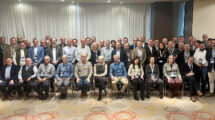Words: Magda Haver, GÉANT
35 participants from 19 NRENs took part in the Special Interest Group for Management of Service Portfolios (SIG-MSP) meeting, the second this year, that took place on 13 April. The meeting covered topics such as the GÉANT Compendium, COVID relief funds and eduTEAMS.
A mini-workshop on the Compendium led by Daniel Wustenberg and Jennifer Ross from GÉANT looked at two main areas: – the service mandate and the service matrix. Concerns were raised about the potential for additional workload caused by changes to the service matrix, however the support offered by GÉANT Partner Relations to coordinate service data collection and the offer from Licia Florio from GÉANT to review all the T&I services in the matrix were gratefully accepted by the audience.
Christos Kanellopoulos from GÉANT provided an update on eduTEAMS, which since its launch in 2018, has witnessed a continuous, growing interest and uptake that has surpassed all expectations. Currently GÉANT is focusing on 3 main strategic areas for the delivery of eduTEAMS-based services:
- Research Infrastructures and Collaborations in the context of the European Open Science Cloud, the NREN community and beyond
- High Performance Computing, with particular focus on EuroHPC
- International Student Mobility programmes
One of the key engagements for eduTEAMS has been the collaboration with SURF for the delivery of the SURF Research Access Management platform (SRAM) which provides members of research collaborations in the Netherlands with fast and secure access to research services. More information about the SRAM can be found on the SURF website https://www.surf.nl/sram
The meeting’s second part focussed on “How NRENs can benefit from EU COVID funding”. The EU countries have set up an impressive recovery fund and a significant part of it needs to be spent on digital transformation, which is taking place at an accelerated pace in the research and education environment.
Edit Herczog form GÉANT talked about EU Recovery and Resilience funds. The Next Generation EU Recovery and Resilience Facility (NGEU-RRF) agreed by the EU27 leaders is a financial tool in support of the fast economic recovery with commitment to the green-digital transition. The EU 27 Member States will prepare their draft national plans by mid-October and approval is expected after an intensive six months evaluation process. The evaluation will follow recommendations from the Economic Semester and the Annual Growth and Stability Plan, with a focus of a minimum 20% investment in digital transformation. Multi-country projects in and outside the EU, and complementing other EU and national funds will be possible. As Research and Education will not be the only beneficiaries, it is therefore crucial that NRENs take part in drafting national plans and in making their opinions count during the consultation phase. Funding starts in June 2021 and will take place twice a year with the last payment at the end of 2026.
Alberto Perez from RedIRIS followed up on this topic and showed us how RedIRIS has been able to secure significant funding from the Recovery and Resilience Facility (RRF) for the deployment of new network infrastructure (fibre and equipment) and for the provision of new shared IT services. We thank RedIRIS for their useful update and for sharing their experience with other NRENs.
The Next SIG-MSP meeting is planned in early Autumn 2021. Proposed topics are a brief follow up on the Compendium, the EOSC portal and financial lifecycle support of activities such as FileSender.
For further information about SIG-MSP and future meetings, please contact Magda Haver.







